Wikidata
Wikidata is a collaboratively edited multilingual knowledge graph hosted by the Wikimedia Foundation.[2] It is a common source of open data that Wikimedia projects such as Wikipedia,[3][4] and anyone else, can use under the CC0 public domain license. Wikidata is a wiki powered by the software MediaWiki, and is also powered by the set of knowledge graph MediaWiki extensions known as Wikibase.
 | |
Screenshot 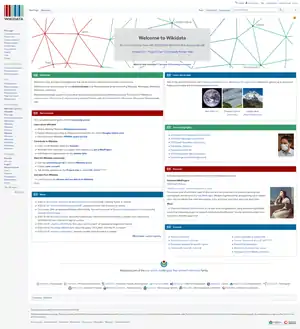 Main page of Wikidata in April 2021 | |
Type of site |
|
|---|---|
| Available in | Multiple languages |
| Owner | Wikimedia Foundation |
| Editor | Wikimedia community |
| URL | www |
| Commercial | No |
| Registration | Optional |
| Launched | 29 October 2012[1] |
Concept
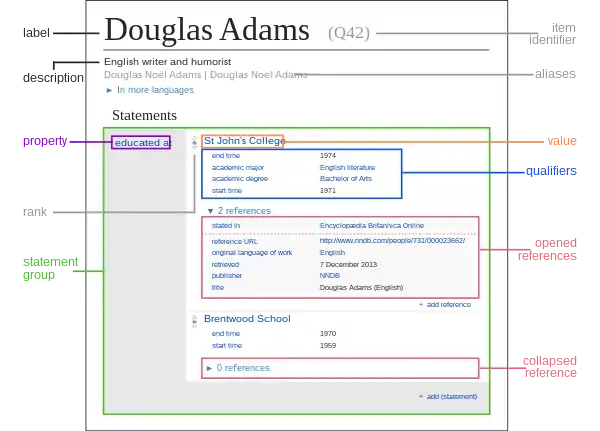
Wikidata is a document-oriented database, focused on items, which represent any kind of topic, concept, or object. Each item is allocated a unique, persistent identifier, a positive integer prefixed with the upper-case letter Q, known as a "QID". This enables the basic information required to identify the topic that the item covers to be translated without favouring any language.
Examples of items include 1988 Summer Olympics (Q8470), love (Q316), Johnny Cash (Q42775), Elvis Presley (Q303), and Gorilla (Q36611).
Item labels need not be unique. For example, there are two items named "Elvis Presley": Elvis Presley (Q303), which represents the American singer and actor, and Elvis Presley (Q610926), which represents his self-titled album. However, the combination of a label and its description must be unique. To avoid ambiguity, an item's unique identifier (QID) is therefore linked to this combination.
Main parts
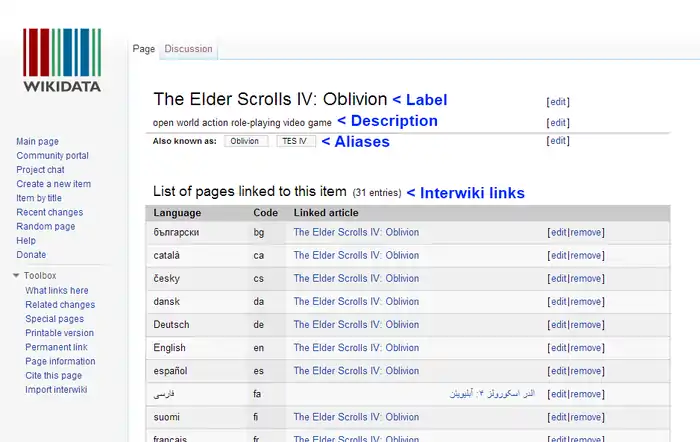
A layout of the four main components of a phase-1 Wikidata page: the label, description, aliases, and interlanguage links.
Fundamentally, an item consists of:
- Obligatorily, an identifier (the QID), related to a label and a description.
- Optionally, multiple aliases and some number of statements (and their properties and values).
Statements
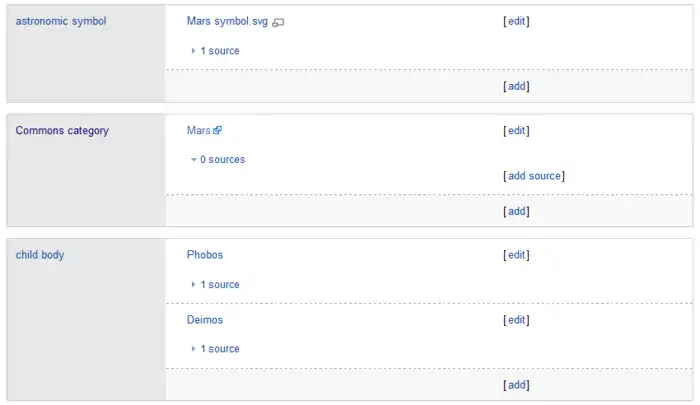
Statements are how any information known about an item is recorded in Wikidata. Formally, they consist of key–value pairs, which match a property (such as "author", or "publication date") with one or more entity values (such as "Sir Arthur Conan Doyle" or "1902"). For example, the informal English statement "milk is white" would be encoded by a statement pairing the property color (P462) with the value white (Q23444) under the item milk (Q8495).
Statements may map a property to more than one value. For example, the "occupation" property for Marie Curie could be linked with the values "physicist" and "chemist", to reflect the fact that she engaged in both occupations.[5]
Values may take on many types including other Wikidata items, strings, numbers, or media files. Properties prescribe what types of values they may be paired with. For example, the property official website (P856) may only be paired with values of type "URL".[6]
Optionally, qualifiers can be used to refine the meaning of a statement by providing additional information. For example, a "population" statement could be modified with a qualifier such as "as of 2011". Values in the statements may also be annotated with references, pointing to a source backing up the statement's content.[7] As with statements, all qualifiers and references are property–value pairs.
Properties

Each property has a numeric identifier prefixed with a capital P and a page on Wikidata with optional label, description, aliases, and statements. As such, there are properties with the sole purpose of describing other properties, such as subproperty of (P1647).
Properties may also define more complex rules about their intended usage, termed constraints. For example, the capital (P36) property includes a "single value constraint", reflecting the reality that (typically) territories have only one capital city. Constraints are treated as testing alerts and hints, rather than inviolable rules.[8]
Before a new property is created, it needs to undergo a discussion process.[9][10]
The most used property is cites work (P2860), which is used on more than 280,000,000 item pages as of October 2022.[11]
Lexemes
In linguistics, a lexeme is a unit of lexical meaning. Similarly, Wikidata's lexemes are items with a structure that makes them more suitable to store lexicographical data. Besides storing the language to which the lexeme refers, they have a section for forms and a section for senses.[12]
EntitySchemas
In January 2019 development started of a new extension for MediaWiki to enable storing Shape Expressions in a separate namespace.[13][14]
This extension has since been installed on Wikidata[15] and enables contributors to use Shape Expressions for validating and describing Resource Description Framework data in items and lexemes. Any item or lexeme on Wikidata can be validated against an Entity Schema, and this makes it an important tool for quality assurance.
Development
The creation of the project was funded by donations from the Allen Institute for Artificial Intelligence, the Gordon and Betty Moore Foundation, and Google, Inc., totaling €1.3 million.[16][17] The development of the project is mainly driven by Wikimedia Deutschland under the management of Lydia Pintscher, and was originally split into three phases:[18]
- Centralising interlanguage links – links between Wikipedia articles about the same topic in different languages.
- Providing a central place for infobox data for all Wikipedias.
- Creating and updating list articles based on data in Wikidata and linking to other Wikimedia sister projects, including Meta-Wiki and the own Wikidata (interwikilinks).
Initial rollout
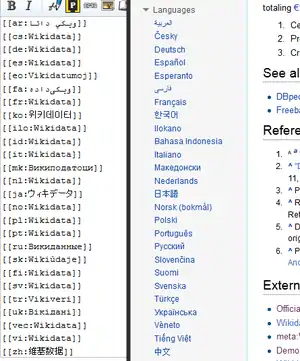 A Wikipedia article's list of interlanguage links as they appeared in an edit box (left) and on the article's page (right) prior to Wikidata. Each link in these lists is to an article that requires its own list of interlanguage links to the other articles; this is the information centralized by Wikidata. |
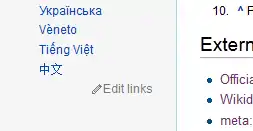 The "Edit links" link nowadays takes the reader to Wikidata to edit interlanguage and interwiki links. |
Wikidata was launched on 29 October 2012 and was the first new project of the Wikimedia Foundation since 2006.[3][19][20] At this time, only the centralization of language links was available. This enabled items to be created and filled with basic information: a label – a name or title, aliases – alternative terms for the label, a description, and links to articles about the topic in all the various language editions of Wikipedia (interwikipedia links).
Historically, a Wikipedia article would include a list of interlanguage links (links to articles on the same topic in other editions of Wikipedia, if they existed). Wikidata was originally a self-contained repository of interlanguage links.[21] Wikipedia language editions were still not able to access Wikidata, so they needed to continue to maintain their own lists of interlanguage links.
On 14 January 2013, the Hungarian Wikipedia became the first to enable the provision of interlanguage links via Wikidata.[22] This functionality was extended to the Hebrew and Italian Wikipedias on 30 January, to the English Wikipedia on 13 February and to all other Wikipedias on 6 March.[23][24][25][26] After no consensus was reached over a proposal to restrict the removal of language links from the English Wikipedia,[27] they were automatically removed by bots. On 23 September 2013, interlanguage links went live on Wikimedia Commons.[28]
Statements and data access
On 4 February 2013, statements were introduced to Wikidata entries. The possible values for properties were initially limited to two data types (items and images on Wikimedia Commons), with more data types (such as coordinates and dates) to follow later. The first new type, string, was deployed on 6 March.[29]
The ability for the various language editions of Wikipedia to access data from Wikidata was rolled out progressively between 27 March and 25 April 2013.[30][31] On 16 September 2015, Wikidata began allowing so-called arbitrary access, or access from a given article of a Wikipedia to the statements on Wikidata items not directly connected to it. For example, it became possible to read data about Germany from the Berlin article, which was not feasible before.[32] On 27 April 2016 arbitrary access was activated on Wikimedia Commons.[33]
According to a 2020 study, a large proportion of the data on Wikidata consists of entries imported en masse from other databases by Internet bots, which helps to "break down the walls" of data silos.[34]
Query service and other improvements
On 7 September 2015, the Wikimedia Foundation announced the release of the Wikidata Query Service,[35] which lets users run queries on the data contained in Wikidata.[36] The service uses SPARQL as the query language. As of November 2018, there are at least 26 different tools that allow querying the data in different ways.[37] It uses Blazegraph as its triplestore and graph database.[38][39]
Logo
The bars on the logo contain the word "WIKI" encoded in Morse code.[40] It was created by Arun Ganesh and selected through community decision.[41]
Reception
In November 2014, Wikidata received the Open Data Publisher Award from the Open Data Institute "for sheer scale, and built-in openness".[42]
In December 2014, Google announced that it would shut down Freebase in favor of Wikidata.[43]
As of November 2018, Wikidata information was used in 58.4% of all English Wikipedia articles, mostly for external identifiers or coordinate locations. In aggregate, data from Wikidata is shown in 64% of all Wikipedias' pages, 93% of all Wikivoyage articles, 34% of all Wikiquotes', 32% of all Wikisources', and 27% of Wikimedia Commons's. Usage in other Wikimedia Foundation projects is a testimonial.[44]
As of December 2020, Wikidata's data was visualized by at least 20 other external tools[45] and over 300 papers have been published about Wikidata.[46]
Wikidata's structured dataset has been used by virtual assistants such as Apple's Siri and Amazon Alexa.[47]
Applications
- Mwnci extension can import data from Wikidata to LibreOffice Calc spreadsheets[48]
- There are (at October 2019) discussions about using QID items in relation to what is being called QID emoji[49]
- Wiki Explorer – Android application to discover things around you and micro editing Wikidata[50]
- KDE Itinerary – a privacy conscious open source travel assistant that uses data from Wikidata[51]
- Google originally started a frame semantic parser project that aims to parse the information on Wikipedia and transfer it into Wikidata by coming up with relevant statements using artificial intelligence.[52]
A systematic literature review of the uses of Wikidata in research was carried in 2019.[53]
See also
- Abstract Wikipedia
- BabelNet
- DBpedia
- Semantic MediaWiki
References
- "The Wikidata revolution is here: enabling structured data on Wikipedia". 25 April 2013. Retrieved 12 June 2022.
Since Wikidata.org went live on 30 October 2012,
- Chalabi, Mona (26 April 2013). "Welcome to Wikidata! Now what?". Retrieved 2 October 2021.
- Wikidata (Archived 29 October 2012 at the Wayback Machine)
- "Data Revolution for Wikipedia". Wikimedia Deutschland. 30 March 2012. Archived from the original on 23 October 2012. Retrieved 11 September 2012.
- "Help:Statements – Wikidata". www.wikidata.org.
- "Help:Data type – Wikidata". www.wikidata.org.
- "Help:Sources – Wikidata". www.wikidata.org.
- "Help:Property constraints portal – Wikidata". www.wikidata.org.
- Cochrane, Euan (30 September 2016). "Wikidata as a digital preservation knowledgebase". openpreservation.org.
- Samuel, John (15 August 2018). "Experimental IR Meets Multilinguality, Multimodality, and Interaction". Experimental IR Meets Multilinguality, Multimodality, and Interaction. CLEF 2018. Lecture Notes in Computer Science. Vol. 11018. p. 129. doi:10.1007/978-3-319-98932-7_12. ISBN 978-3-319-98931-0.
- "Wikidata:Database reports/List of properties/Top100". Retrieved 15 October 2022.
- "Wikidata:Lexicographical data/Documentation – Wikidata". www.wikidata.org.
- "Extension:EntitySchema - MediaWiki". mediawiki.org. Retrieved 10 September 2021.
- "Initial empty repository". Gerrit. 15 January 2019. Retrieved 12 June 2022.
- "Version - Wikidata". Wikidata.org. Retrieved 10 September 2021.
- Dickinson, Boonsri (30 March 2012). "Paul Allen Invests In A Massive Project To Make Wikipedia Better". Business Insider. Retrieved 11 September 2012.
- Perez, Sarah (30 March 2012). "Wikipedia's Next Big Thing: Wikidata, A Machine-Readable, User-Editable Database Funded By Google, Paul Allen And Others". TechCrunch. Archived from the original on 5 October 2012. Retrieved 11 September 2012.
- "Wikidata – Meta". meta.wikimedia.org.
- Pintscher, Lydia (30 October 2012). "wikidata.org is live (with some caveats)". wikidata-l (Mailing list). Retrieved 3 November 2012.
- Roth, Matthew (30 March 2012). "The Wikipedia data revolution". Wikimedia Foundation. Archived from the original on 11 September 2012. Retrieved 11 September 2012.
- Leitch, Thomas (1 November 2014). Wikipedia U: Knowledge, Authority, and Liberal Education in the Digital Age. Johns Hopkins University Press. p. 120. ISBN 978-1-4214-1550-5.
- Pintscher, Lydia (14 January 2013). "First steps of Wikidata in the Hungarian Wikipedia". Wikimedia Deutschland. Retrieved 17 December 2015.
- Pintscher, Lydia (30 January 2013). "Wikidata coming to the next two Wikipedias". Wikimedia Deutschland. Retrieved 31 January 2013.
- Pintscher, Lydia (13 February 2013). "Wikidata live on the English Wikipedia". Wikimedia Deutschland. Retrieved 15 February 2013.
- Pintscher, Lydia (6 March 2013). "Wikidata now live on all Wikipedias". Wikimedia Deutschland. Retrieved 8 March 2013.
- "Wikidata ist für alle Wikipedien da" (in German). Golem.de. Retrieved 29 January 2014.
- "Wikipedia talk:Wikidata interwiki RFC". 29 March 2013. Retrieved 30 March 2013.
- Pintscher, Lydia (23 September 2013). "Wikidata is Here!". Commons:Village pump.
- Pintscher, Lydia. "Wikidata/Status updates/2013 03 01". Wikimedia Meta-Wiki. Wikimedia Foundation. Retrieved 3 March 2013.
- Pintscher, Lydia (27 March 2013). "You can have all the data!". Wikimedia Deutschland. Retrieved 28 March 2013.
- "Wikidata goes live worldwide". The H. 25 April 2013. Archived from the original on 1 January 2014.
- Lydia, Pintscher (16 September 2015). "Wikidata: Access to data from arbitrary items is here". Wikipedia:Village pump (technical). Retrieved 30 August 2016.
- Lydia, Pintscher (27 April 2016). "Wikidata support: arbitrary access is here". Commons:Village pump. Retrieved 30 August 2016.
- Waagmeester, Andra; Stupp, Gregory; Burgstaller-Muehlbacher, Sebastian; et al. (17 March 2020). "Wikidata as a knowledge graph for the life sciences". eLife. 9. doi:10.7554/ELIFE.52614. ISSN 2050-084X. PMC 7077981. PMID 32180547. Wikidata Q87830400.
- "Home". query.wikidata.org.
- "[Wikidata] Announcing the release of the Wikidata Query Service - Wikidata - lists.wikimedia.org".
- "Wikidata:Tools/Query data – Wikidata". www.wikidata.org.
- "[Wikidata-tech] Wikidata Query Backend Update (take two!)". lists.wikimedia.org. Retrieved 29 August 2018. (The message also contains a link to the graph databases comparison performed by Wikimedia.)
- "Blazegraph fork?". GitHub. 12 April 2018.
- commons:File talk:Wikidata-logo-en.svg#Hybrid. Retrieved 2016-10-06.
- "Und der Gewinner ist..." 13 July 2012.
- "First ODI Open Data Awards presented by Sirs Tim Berners-Lee and Nigel Shadbolt". Archived from the original on 24 March 2016.
- "Freebase". Google Plus. 16 December 2014. Archived from the original on 20 March 2019.
- "Percentage of articles making use of data from Wikidata". Archived from the original on 15 November 2018. Retrieved 15 November 2018.
- "Wikidata:Tools/Visualize data – Wikidata". www.wikidata.org.
- "Scholia". Scholia.
- Simonite, Tom (18 February 2019). "Inside the Alexa-Friendly World of Wikidata". Wired. ISSN 1059-1028. Retrieved 25 December 2020.
- "Rob Barry / Mwnci – Deep Spreadsheets". GitLab.
- "Public Review Issues".
- "Wiki Explorer in the Google Play Store".
- Krause, Volker (12 January 2020), KDE Itinerary – A privacy by design travel assistant, retrieved 10 November 2020
- SLING - A natural language frame semantics parser, Google, 14 November 2021, retrieved 14 November 2021
- Mora-Cantallops, Marçal; Sánchez-Alonso, Salvador; García-Barriocanal, Elena (2 September 2019). "A systematic literature review on Wikidata". Data Technologies and Applications. 53 (3): 250–268. doi:10.1108/DTA-12-2018-0110. S2CID 202036639.
Further reading
- Mark Graham (6 April 2012), "The Problem With Wikidata", The Atlantic, US
- Claudia Müller-Birn, Benjamin Karran, Janette Lehmann, Markus Luczak-Rösch: Peer-production system or collaborative ontology development effort: What is Wikidata? In, OpenSym 2015 – Conference on Open Collaboration, San Francisco, US, 19 – 21 Aug 2015 (preprint).
External links
- Official website
 (Mobile)
(Mobile) - Videos: WikidataCon on media.ccc.de